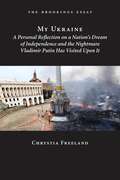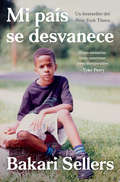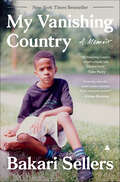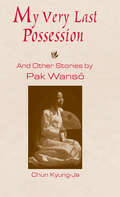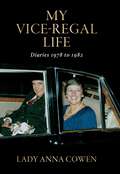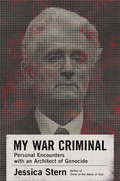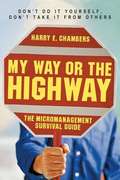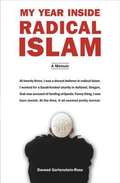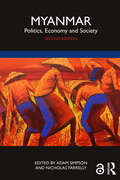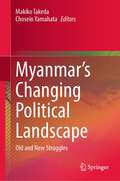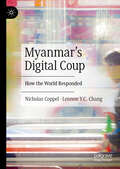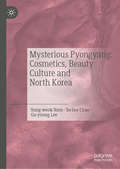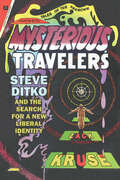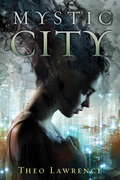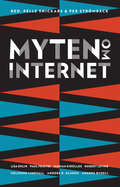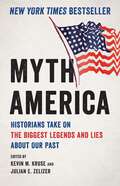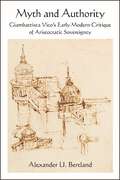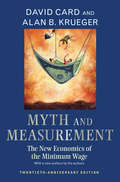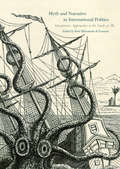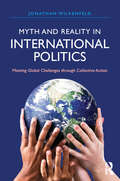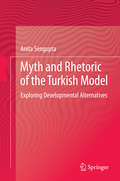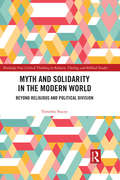- Table View
- List View
My Ukraine
by Chrystia FreelandSince the breakup of the Soviet Union in 1991, former Soviet republic Ukraine has struggled against its "giant neighbor to the north"--Russia-- to maintain its sovereignty. In early 2014 tensions turned to conflict as Vladimir Putin, determined to keep Ukraine from forging stronger ties with the West, seized Crimea and fomented conflict in eastern Ukraine. In the latest Brookings essay, Chrystia Freeland, a former Ukrainian-based reporter with strong family ties to the country, offers a personal reflection on the conflict and the sentiment of the Ukrainian people. She highlights the fact that despite historic, cultural, and linguistic ties between the two countries, Ukrainians stand defiant in their desire for independence.
My Ukraine
by Chrystia FreelandSince the breakup of the Soviet Union in 1991, former Soviet republic Ukraine has struggled against its "giant neighbor to the north"-Russia- to maintain its sovereignty. In early 2014 tensions turned to conflict as Vladimir Putin, determined to keep Ukraine from forging stronger ties with the West, seized Crimea and fomented conflict in eastern Ukraine. In the latest Brookings essay, Chrystia Freeland, a former Ukrainian-based reporter with strong family ties to the country, offers a personal reflection on the conflict and the sentiment of the Ukrainian people. She highlights the fact that despite historic, cultural, and linguistic ties between the two countries, Ukrainians stand defiant in their desire for independence.
My Vanishing Country \ Mi país se desvanece (Spanish edition): Memorias
by Bakari SellersEn estas memorias, el analista político y representante de estado más joven de Carolina del Sur ahonda sobre las vidas del olvidado sur negro. «Soy del llamado País Bajo de Carolina del Sur, donde se entrelazan la belleza, la historia y la desgracia. Basta conducir cincuenta millas en cualquier dirección para hallarse en los mismos campos donde los esclavos —algunos de ellos, ancestros no tan lejanos— sudaban sobre el algodón, el índigo, la caña de azúcar, el arroz, el trigo y la soja. Específicamente, soy de Dinamarca, Carolina del Sur, un lugar donde todo el mundo conocía mi apellido; un apellido, según descubrí en mi infancia, teñido por el honor y la infamia».En cada capítulo, Bakari Sellers nos permite presenciar las vidas y luchas cotidianas de la población afroamericana rural del sur de los Estados Unidos a través de tanto sus vivencias como anécdotas históricas y políticas.Mi país se desvanece es un recorrido nostálgico, conmovedor y sincero sobre los acontecimientos e injusticas que marcaron a generaciones de hombres y mujeres negras, incluida la familia Sellers, hasta hoy día. Con estas memorias, Sellers adopta una nueva vía de lucha por los derechos civiles afroamericanos.Bakari Sellers es analista político en CNN y el miembro más joven en toda la historia de la legislatura estatal de Carolina del Sur. Incluido en la lista de «Los 40 de menos de 40» de la revista Time en 2010, también es abogado que lucha por dar voz a los que no la tienen.
My Vanishing Country: A Memoir
by Bakari SellersNew York Times Bestseller: This insightful and deeply personal portrait of African American working-class life “offers something so authentic . . . compelling” (Charleston Post and Courier).Part memoir, part historical and cultural analysis, My Vanishing Country is an eye-opening journey through the South’s past, present, and future.Anchored in Bakari Sellers’ hometown of Denmark, South Carolina, My Vanishing Country illuminates the pride and pain that continues to fertilize the soil of one of the poorest states in the nation. He traces his father’s rise to become a friend of Stokely Carmichael and Martin Luther King, civil rights hero, and member of the Student Non-Violent Coordinating Committee (SNCC), in the process exploring the plight of the South’s dwindling rural black working class—many of whom can trace their ancestry back for seven generations.In his poetic personal history, we are awakened to the crisis affecting the other “forgotten men and women,” seldom acknowledged by the media. For Sellers, these are his family members, neighbors, and friends. He humanizes the struggles that shape their lives—to gain access to healthcare as rural hospitals disappear; to make ends meet as the factories they have relied on shut down and move overseas; to hold on to precious traditions as their towns erode; to forge a path forward without succumbing to despair. My Vanishing Country is also a love letter to fatherhood—to Sellers’ father, his lodestar, whose life lessons have shaped him, and to his newborn twins, who he hopes will embrace the Sellers family name and honor its legacy.“An engaging memoir.” —Kirkus Reviews“Family trauma—even inherited trauma—can take a tremendous toll on children. But as Bakari Sellers makes plain in My Vanishing Country, family trauma can also be a source of strength.” —BookPage
My Very Last Possession and Other Stories
by Wan-so Pak Kyung-Ja ChunAn anthology of ten short stories by one of Korea's foremost living writers. Pak Wanso is the author of five novels, including The Naked Tree, and of several best-selling volumes of short prose. Her works have sold millions of copies in Korea, where the public and critics alike have applauded Pak as a masterful realist.The literary world of Pak depicts the trials of the Korean War and the subsequent three decades of upheaval during which Korea was transformed from a military dictatorship and an agriculturally based society to an urban industrialized, albeit troubled, democracy. Pak offers a searching woman's perspective on radical changes in Korean family structures and social values, exposing the cruelty and hypocrisy of Korea's Confucian traditions, which have subjugated women for centuries. Her realistic prose also portrays the dehumanizing impacts of the capitalist market order that characterizes Korea today.With rich insight, Pak presents moral ambiguities inherent in Korea's society today and encourages her readers to question the injustices that prevail in the more impersonal and often alienated world emerging in a "globalized" Korea.
My Vice-Regal Life: Diaries 1978 to 1982
by Lady Anna CowenSunday, 8 January 1978I have decided to keep a diary during Zelman's term of office as Governor-General. I am pleased, because I forget so much and the re-reading of a sentence brings whole occasions, scenes, and otherwise forgotten things, vividly back to mind...And so begins an extraordinary record of the life of a Governor-General's wife. Lady Anna Cowen's edited diaries capture the day-to-day life—the wardrobe fittings, the running of an enormous household—as well as the pomp and circumstance of vice-regal duties during the term Sir Zelman Cowen, the 'healing Governor-General', served after the dismissal by Sir John Kerr of the Whitlam government.
My Vote Counts!
by Jeffrey B. Fuerst Juda Mann Marvin Mathew Luciana Nikolajevic Siniria Paulino Violet ZektserMeet five American citizens who voted for the first time in the 2012 election. What was the experience like? What did they feel as they came away from the voting booth? Read this book and get a firsthand look at democracy in action.
My War Criminal: Personal Encounters with an Architect of Genocide
by Jessica SternAn investigation into the nature of violence, terror, and trauma through conversations with a notorious war criminal by Jessica Stern, one of the world's foremost experts on terrorism.Between October 2014 and November 2016, global terrorism expert Jessica Stern held a series of conversations in a prison cell in The Hague with Radovan Karadzic, a Bosnian Serb former politician who had been indicted for genocide and other war crimes during the Bosnian War and who became an inspiration for white nationalists. Though Stern was used to interviewing terrorists in the field in an effort to understand their hidden motives, the conversations she had with Karadzic would profoundly alter her understanding of the mechanics of fear, the motivations of violence, and the psychology of those who perpetrate mass atrocities at a state level and who—like the terrorists she had previously studied—target noncombatants, in violation of ethical norms and international law.How do leaders persuade ordinary people to kill their neighbors? What is the “ecosystem” that creates and nurtures genocidal leaders? Could anything about their personal histories, personalities, or exposure to historical trauma shed light on the formation of a war criminal’s identity in opposition to a targeted Other?In My War Criminal, Jessica Stern brings to bear her incisive analysis and her own deeply considered reactions to her interactions with Karadzic, a brilliant and often shockingly charming psychiatrist and poet who spent twelve years in hiding, disguising himself as an energy healer, while also offering a deeply insightful and sometimes chilling account of the complex and even seductive powers of a magnetic leader—and what can happen when you spend many, many hours with that person.
My Way or the Highway: The Micromanagement Survival Guide
by Harry E. ChambersWhat to do when you are micromanaged, and how to avoid becoming a micromanager.
My Year Inside Radical Islam
by Gartenstein-Ross DaveedMy Year Inside Radical Islamis a memoir of first a spiritual and then a political seduction. Raised in liberal Ashland, Oregon, by parents who were Jewish by birth but dismissive of strict dogma, Daveed Gartenstein-Ross yearned for a religion that would suit all his ideals. At college in the late nineties he met a charismatic Muslim student who grounded his political activism with thoughtful religious conviction. Gartenstein-Ross reflects on his experience of converting to Islam-a process that began with a desire to connect with both a religious community and a spiritual practice, and eventually led him to sympathize with the most extreme interpretations of the faith, with the most radical political implications. In the year following graduation, Gartenstein-Ross went to work for the al-Haramain Islamic Foundation, a charity dedicated to fostering Wahhabism, Saudi Arabia's austere form of Islam-a theological inspiration for many terrorist groups, including al-Qaeda. Shortly after he left al-Haramain-when his own fan-aticism had waned-the foundation was charged by the U. S. government as being a source of funds for terrorist organizations. Gartenstein-Ross, by this time a lawyer at a prominent firm, volunteered to be questioned by the FBI. They already knew who he was. The story of how a good faith can be distorted and a decent soul can be seduced away from its principles, My Year Inside Radical Islamprovides a rare glimpse into the personal interface between religion and politics.
My Year Inside Radical Islam: A Memoir
by Daveed Gartenstein-RossMy Year Inside Radical Islam is a memoir of first a spiritual and then a political seduction. Raised in liberal Ashland, Oregon, by parents who were Jewish by birth but dismissive of strict dogma, Daveed Gartenstein-Ross converted to Islam in college-a process that began with a desire to connect with both a religious community and a spiritual practice, and eventually led him to sympathize with the most extreme interpretations of the faith with the most radical political implications. In the year following graduation, Gartenstein-Ross went to work for the Al Haramain Islamic Foundation, a charity dedicated to fostering Wahhabism, Saudi Arabia's austere form of Islam-a theological inspiration for many terrorist groups, including al-Qaeda. Shortly after he left Al Haramain-when his own fanaticism had waned-the foundation was charged by the U.S. government for a money-laundering scheme that was seemingly designed to finance terrorist organizations. Gartenstein-Ross, by this time a lawyer at a prominent firm, volunteered for questioning by the FBI. They already knew who he was. The story of how a good faith can be distorted and a decent soul can be seduced away from his principles, My Year Inside Radical Islam provides a rare glimpse into the personal interface between religion and politics.
Myanmar: Politics, Economy and Society
by Adam Simpson Nicholas FarrellyThis new edition of Myanmar: Politics, Economy and Society provides a sophisticated yet accessible overview of the key political, economic and social challenges facing contemporary Myanmar and explains the complex historical and ethnic dynamics that have shaped the country. Thoroughly revised, the book analyses the context and tragic consequences of the military coup in February 2021 and the COVID-19 pandemic. With clear and incisive contributions from the world’s leading Myanmar scholars, this book assesses the policies and political reforms that have provoked contestation in Myanmar’s recent history and driven both economic and social change. In this context, questions of economic ownership and control and the distribution of natural resources are shown to be deeply informed by long-standing fractures among ethnic and civil-military relations. The chapters analyse the key issues that constrain or expedite societal development in Myanmar and place recent events of national and international significance in the context of its complex history and social relations. The book provides detailed analysis of the coup, which overturned a decade of political and economic reforms and threw the country into chaos. It explains the drivers for the coup, how it has impacted on the country and the future prospects for accountability and justice. Filling a gap in the market, this research textbook and primer will be of interest to upper undergraduates, postgraduates and scholars of Southeast Asian politics, economics and society and to journalists and professionals working within governments, companies and other organisations.
Myanmar’s Changing Political Landscape: Old and New Struggles
by Makiko Takeda Chosein YamahataMyanmar has faced numerous divisions that hinder its democratization and peacebuilding processes since emerging out of decades of military dictatorship. The coup d’état in 2021 terminated Myanmar’s limited and nascent democratization under the civilian leadership of the National League for Democracy (NLD); not only did the coup regime resurface old struggles, but also created new ones. Against the backdrop of Myanmar’s changing political landscapes from military to quasi-civilian to civilian rule in 2016, and back to military rule in 2021, the book discusses the various forms of interconnected struggles, both old and new. In this process, the contributed chapters come together to highlight the changing dynamics of stakeholders, relations between agents and beneficiaries, and the generated evolutionary processes in Myanmar’s democratization and its reversal. This book brings an even mix of researchers both within and outside of Myanmar to critically discuss how different agents and their interactions, in the form of center-periphery as well as state-non-state relations, continuously shape today’s political landscape. Its interdisciplinary composition also invites readers from various backgrounds to grasp with engaged research that identifies the various challenges and addresses ways in which to facilitate change from local and international perspectives.
Myanmar’s Digital Coup: How the World Responded
by Lennon Y.C. Chang Nicholas CoppelThis book explores the nature, scope, merits and limits of international responses to Myanmar’s February 2021 coup. The novelty of this book lies in its analysis of the coup in the digital age. While the literature on Myanmar addresses issues such as earlier periods of reform, Myanmar’s political transition, the Saffron revolution, and human rights, there is still limited research that looks into the influence of digitalised Myanmar on the post-coup Civil Disobedience Movement and protestors. Myanmar opened and changed enormously in the past ten years. The use of technology and the Internet increased phenomenally, exposing Myanmar’s citizenry to new ideas, experiences and ways of viewing the world. The impact of these developments on responses to the 2021 coup is the focus of this book.Myanmar’s opening to the world and its digitalisation has made this coup different from the three previous coups. The book's starting point is that diplomacy is no longer (if it everwas) the preserve of governments and diplomats. International organisations, not-for-profit organisations, large corporations, academia, civil society, social media, and even individuals have all been engaged and sought to influence developments.Drawing extensively on primary sources (official statements by UN agencies, foreign governments, international corporations, NGOs and Burma campaign activists) and experiences as a senior diplomat and an academic working with Myanmar’s government to build cyber capacity and cyber security awareness, this book takes a fresh look at all forms of international behaviour that seek to bring about change in a rogue or pariah state. The book will be the first to study the part played by Gen Z and their facility with smart phone technology to mobilise, inform and build opposition to the coup. To what extent did the youth of Myanmar learn from Hong Kong, Taiwan, Thailand and the so-called “milk tea alliance”? How has dependenceon the internet affected the operations of the security forces and the Civil Disobedience Movement? How did both sides deploy misinformation and disinformation to achieve their respective goals?The book thus provides an informative guide for those seeking an understanding of what has happened and what, short of a military intervention, can be done about it. It examines international responses in the first year following the coup, candidly assessing their feasibility, efficacy and utility. Recent developments are situated within the context of Myanmar’s modern history and the discourse on the effectiveness of sanctions compared with engagement.The book also critically examines ASEAN’s role – how does ASEAN see its role, how does the National Unity Government regard ASEAN endeavours, and how does the rest of the world view ASEAN’s capacity to address Myanmar’s problems? We evaluate ASEAN’s principle of non-interference in the internalaffairs of member states. Does this principle matter more to it than judgments about its weakness and inability to deal with breaches of the ASEAN Charter?
Mysterious Pyongyang: Cosmetics, Beauty Culture and North Korea
by Nam Sung-wook Chae Su-lan Lee Ga-youngThis book is written with the belief that the peaceful unification of Korean Peninsula will be upon us on the day that every woman in North Korea uses South Korean and global cosmetics. The authors focus on understanding the intentions behind the three leaders of North Korea, Kim Il-sung, Kim Jong-il and Kim Jong-un, based on their comments on the cosmetics industry and their field guidance tendencies, analyzing the governance style of Pyongyang through women’s life and beauty culture. It is the earliest book of its kind in the women’s life and beauty culture of North Korea.
Mysterious Travelers: Steve Ditko and the Search for a New Liberal Identity (Great Comics Artists Series)
by Zack KruseSteve Ditko (1927–2018) is one of the most important contributors to American comic books. As the cocreator of Spider-Man and sole creator of Doctor Strange, Ditko made an indelible mark on American popular culture. Mysterious Travelers: Steve Ditko and the Search for a New Liberal Identity resets the conversation about his heady and powerful work. Always inward facing, Ditko’s narratives employed superhero and supernatural fantasy in the service of self-examination, and with characters like the Question, Mr. A, and Static, Ditko turned ordinary superhero comics into philosophic treatises. Many of Ditko’s philosophy-driven comics show a clear debt to ideas found in Ayn Rand’s Objectivism. Unfortunately, readers often reduce Ditko’s work to a mouthpiece for Rand’s vision. Mysterious Travelers unsettles this notion. In this book, Zack Kruse argues that Ditko’s philosophy draws on a complicated network of ideas that is best understood as mystic liberalism. Although Ditko is not the originator of mystic liberalism, his comics provide a unique window into how such an ideology operates in popular media. Examining selections of Ditko’s output from 1953 to 1986, Kruse demonstrates how Ditko’s comics provide insight into a unique strand of American thought that has had a lasting impact.
Mystic City
by Theo LawrenceA magical city divided. A political rebellion ignited. A love that was meant to last forever.Aria Rose, youngest scion of one of Mystic City's two ruling rival families, finds herself betrothed to Thomas Foster, the son of her parents' sworn enemies. The union of the two will end the generations-long political feud--and unite all those living in the Aeries, the privileged upper reaches of the city, against the banished mystics who dwell below in the Depths. But Aria doesn't remember falling in love with Thomas; in fact, she wakes one day with huge gaps in her memory. And she can't conceive why her parents would have agreed to unite with the Fosters in the first place. Only when Aria meets Hunter, a gorgeous rebel mystic from the Depths, does she start to have glimmers of recollection--and to understand that he holds the key to unlocking her past. The choices she makes can save or doom the city--including herself.
Myten om internet
by Robert Levine Pelle Snickars Mariam Kirollos Paul Frigyes Lisa Ehlin Anders R. Olsson Helienne Lindvall Per Strömbäck Anders RydellVilken funktion hade egentligen sociala medier under den arabiska våren? Vilka är den digiala underklassen? Och hur har en handfull teknikföretag i Silicon Valley lyckats sprida ryktet om sig själva som det fria ordet och kunskapens främsta förespråkare När internet ska diskuteras används ofta begrepp som frihet, demokrati och delaktighet. Att internet har haft en otrolig betydelse tvivlar ingen på, men samtidigt finns en mängd löst grundade föreställningar att internet kommer infria alla förhoppningar, en sorts tekno-utopi. Internet är på ett plan öppet och fritt, men lika mycket är det skapat av offentliga regleringar, teknik och affärsintressen. 85 procent av de så kallade stadsnäten ägs av kommunala bolag. Den grundläggande infrastrukturen för nätet i Sverige är alltså i allmän ägo, tvärtemot den gängse bilden att internet drivs av marknadskrafterna. I Myten om internet har såväl svenska som internationella namn samlats för att nyansera bilden av internet, och inte minst blottlägga vilka som har gynnats av de rådande föreställningarna. Bland skribenterna märks egyptiska Mariam Kirollos, aktivist och doktorand, som starkt ifrågasätter hyllningarna av sociala mediers roll i den arabiska våren, och Robert Levine, amerikansk författare och journalist, som utkom med den mycket uppmärksammade boken Free Ride 2011.
Myth America: Historians Take On the Biggest Legends and Lies About Our Past
by Julian E. Zelizer Kevin M. KruseIn this instant New York Times bestseller, America&’s top historians set the record straight on the most pernicious myths about our nation&’s past. The United States is in the grip of a crisis of bad history. Distortions of the past promoted in the conservative media have led large numbers of Americans to believe in fictions over facts, making constructive dialogue impossible and imperiling our democracy. In Myth America, Kevin M. Kruse and Julian E. Zelizer have assembled an all-star team of fellow historians to push back against this misinformation. The contributors debunk narratives that portray the New Deal and Great Society as failures, immigrants as hostile invaders, and feminists as anti-family warriors—among numerous other partisan lies. Based on a firm foundation of historical scholarship, their findings revitalize our understanding of American history. Replacing myths with research and reality, Myth America is essential reading amid today&’s heated debates about our nation&’s past. With Essays ByAkhil Reed Amar • Kathleen Belew • Carol Anderson • Kevin Kruse • Erika Lee • Daniel Immerwahr • Elizabeth Hinton • Naomi Oreskes • Erik M. Conway • Ari Kelman • Geraldo Cadava • David A. Bell • Joshua Zeitz • Sarah Churchwell • Michael Kazin • Karen L. Cox • Eric Rauchway • Glenda Gilmore • Natalia Mehlman Petrzela • Lawrence B. Glickman • Julian E. Zelizer
Myth and Authority: Giambattista Vico's Early Modern Critique of Aristocratic Sovereignty (SUNY series in Contemporary Italian Philosophy)
by Alexander U. BertlandLiving in a province dominated by powerful oligarchs, Giambattista Vico (1668–1744) concluded that political philosophy should work to undermine aristocratic authority and prevent political devolution into feudalism. Rejecting the possibility that the free market could successfully instill civil behavior, he advocated for a strong central judicial system to work closely with citizens to promote stability and justice. This study puts Vico in conversation with other Enlightenment thinkers such as Locke, Rousseau, and Mandeville to show how his alternative warrants serious consideration. In contrast to scholars who read Vico's New Science as a defense of the imagination, this study casts his account of poetic wisdom politically as an epistemological critique of the aristocratic mentality. Myth and Authority argues that Vico's depiction of pagan religion is a refined attempt to explain how oligarchy maintains its stranglehold on power. While Western civilization did not follow the path Vico suggested, it may now be more relevant as concerns grow about the increasing influence of the wealthy on civil institutions.
Myth and Measurement
by Alan B. Krueger David CardDavid Card and Alan B. Krueger have already made national news with their pathbreaking research on the minimum wage. Here they present a powerful new challenge to the conventional view that higher minimum wages reduce jobs for low-wage workers. In a work that has important implications for public policy as well as for the direction of economic research, the authors put standard economic theory to the test, using data from a series of recent episodes, including the 1992 increase in New Jersey's minimum wage, the 1988 rise in California's minimum wage, and the 1990-91 increases in the federal minimum wage. In each case they present a battery of evidence showing that increases in the minimum wage lead to increases in pay, but no loss in jobs. A distinctive feature of Card and Krueger's research is the use of empirical methods borrowed from the natural sciences, including comparisons between the "treatment" and "control" groups formed when the minimum wage rises for some workers but not for others. In addition, the authors critically reexamine the previous literature on the minimum wage and find that it, too, lacks support for the claim that a higher minimum wage cuts jobs. Finally, the effects of the minimum wage on family earnings, poverty outcomes, and the stock market valuation of low-wage employers are documented. Overall, this book calls into question the standard model of the labor market that has dominated economists' thinking on the minimum wage. In addition, it will shift the terms of the debate on the minimum wage in Washington and in state legislatures throughout the country.With a new preface discussing new data, Myth and Measurement continues to shift the terms of the debate on the minimum wage.
Myth and Narrative in International Politics
by Berit Bliesemann de GuevaraThis book systematically exploreshow different theoretical concepts of myth can be utilised to interpretivelyexplore contemporary international politics. From the international communityto warlords, from participation to effectiveness - international politics isreplete with powerful narratives and commonly held beliefs that qualify asmyths. Rebutting the understanding of myth-as-lie, this collection of essaysunearths the ideological, naturalising, and depoliticising effect of myths. Myth and Narrative inInternational Politics: Interpretive Approaches to the Study of IRoffers conceptual and methodological guidance on how to make sense of differentmyth theories and how to employ them in order to explore the powerfulcollective imaginations and ambiguities that underpin international politicstoday. Further, it assembles case studies of specific myths in different fieldsof International Relations, including warfare, global governance,interventionism, development aid, and statebuilding. The findings challengeconventional assumptions in International Relations, encouraging academics in IR and across a range of different fieldsand disciplines, including development studies, global governance studies,strategic and military studies, intervention and statebuilding studies, andpeace and conflict studies, to rethink ideas that are widely unquestioned bypolicy and academic communities.
Myth and Reality in International Politics: Meeting Global Challenges through Collective Action (International Studies Intensives Ser.)
by Jonathan WilkenfeldRecent generations have experienced dramatic improvements in the quality of human life across the globe. Wars between states are fought less frequently and are less lethal. Food is more plentiful and more easily accessed. In most parts of the world, birthrates are down and life expectancy up. Significantly fewer people live in extreme poverty, relative to the overall population. Statistics would argue that the human race has never before flourished as it has in this moment.And yet, even with this progress, we face a number of seemingly intractable challenges to the welfare of both states and individuals, including: Governmental instability undermining the lives of citizens, both within and beyond their borders; Persistent and recurring intrastate conflict due to ineffective conflict management strategies; Marginally successful development efforts and growing income inequality, both within and between nations, as a result of uncoordinated and ineffective global development strategies; Internecine conflict in multiethnic societies, manifested by exclusion, discrimination, and ultimately violence, the inevitable consequence of an insufficient focus on managing the inherent tensions in diverse societies; Global climate change with the possibility of catastrophic long-term consequences, following an inability to effectively come to terms with and respond to the impact of human activity on our environment. These challenges require a newly collaborative, intentional, and systematic approach. This book offers a blueprint for how to get there, calling for increased leadership responsibility, clarity of mission, and empowerment of states and individuals. It is designed to transform lofty but often vague agendas into concrete, measurable progress. It believes in the capacity of humanity to rise to the occasion, to come together to address these increasingly critical global problems, and offers one way forward.
Myth and Rhetoric of the Turkish Model
by Anita SenguptaThe volume discusses what the Turkish Model, or Turkish Development Alternative, was and why it was promoted in the Central Asian republics immediately following the dissolution of the Soviet Union. It argues that the Turkish Model was a myth that transferred the ideal of a ''secular, democratic, liberal society'' as a model for the post Soviet Turkic world and in the process encouraged a ''Turkic" rhetoric that emphasized connection between the two regions based on a common ancestry. The volume begins with an understanding of the reality of the Model from a Turkish perspective and then goes on to examine whether the Turkic world as a "cultural-civilizational alternative" makes sense both from a historical as well as contemporary perspective. It concludes by looking at the re-emergence of the Model in the wake of the events in West Asia in early 2011 and examines how in the light of a search for options the Turkish Model is once again projected as viable.
Myth and Solidarity in the Modern World: Beyond Religious and Political Division (Routledge New Critical Thinking in Religion, Theology and Biblical Studies)
by Timothy StaceyIn the context of the rise of reactionary politics across the globe, this book seeks new ways of developing solidarity across religious, political and economic differences. Drawing on an increasingly influential Christian theological movement, postliberalism, it claims that the dominance of liberal, secular rationality has blinded people to the fundamental role of transcendence and myth in developing solidarity. The result is either atrophy, or a retrenching in divisive myths of faith, race, nation or economic status. Liberalism is now a dominant force across the globe. But its resonance in the Anglo-Saxon West, from which it originates and has been most fully realized, is relatively underexplored. The book thus follows two simultaneous lines of enquiry. Firstly, a genealogical study of social scientific and policy iterations of the relationship between belief and solidarity in the Anglo-Saxon West, placing postliberal theory into dialogue with the sociology and anthropology of religion, politics and economics. Secondly, it draws from original ethnographic research with groups in London, UK, that seek to develop solidarity in the face of deep-seated difference. By bringing a new way of framing these contentious debates about contemporary society, this research offers tools for more productive conversations around religious and political topics, in particular concluding with a clear policy proposal. It is, therefore, a useful resource for both academics of theology and religious studies, political philosophy, sociology and anthropology; and for politicians, policy makers and practitioners hoping to develop solidarity in the modern world.
